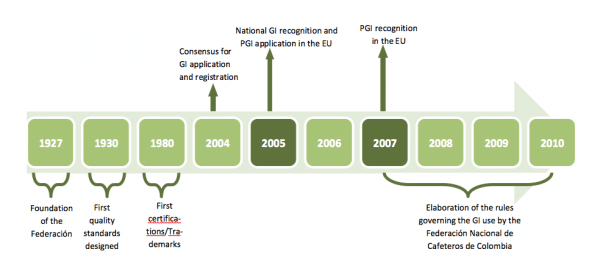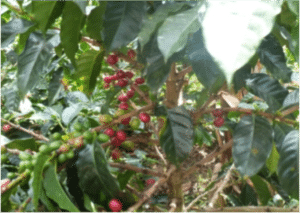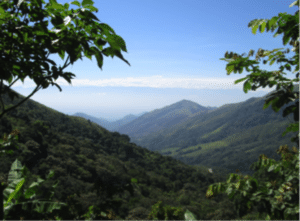Strengthening the commons
Geographical names have been used as hallmarks of artisans associations (guilds) since the Middle Ages to attest the geographical area a certain product comes from and to avoid misuse. Hence, Geographical Indications (GIs) are understood as a delimited geographical space where a human community has constructed through history an intellectual and collective know-how of production, based on a system of interactions between people and the physical and biological environment following agreed rules (e.g. product specifications). GIs as collectively established and managed intellectual property rights are comparable to common-pool resources as they refer to natural and/or human systems with limited benefits also challenged by over-exploitation and free-riding. Clear institutions (rules of the game), monitoring and sanctioning efforts are needed to preserve the identity and specific quality of the GI products, to develop its reputation and to effectively exclude illegitimate users (only producers which are located in the defined GI area and comply with the product specifications are allowed to benefit from the reputation). Furthermore, growers and industrial processors shall not over-produce and flood the market with GI products due to the limited number of consumers willing to pay a price premium for the GI products.

Colombian coffee growers associated to the Federación Nacional de Cafeteros de Colombia (founded in 1927) have been able to protect their coffee production, tradition and quality through a Protected Geographical Indication (PGI) under the European Union (EU) legislation. The GI project was approved in 2004, the Colombian government recognized the national GI in 2005, and the EU granted the PGI in September 2007. Federated growers saw in the GIs an opportunity to define the rules for governing the GI use by them, whereas other coffee quality standards and their rules of the game are defined by international players normally based in the global North. Up to August 2014, a total of 230 brands belonging to 62 roasters have signed agreements framed by the Federación and have become authorized PGI users. Colombia was the first non-European country that registered a GI in the EU followed by nations such as Brazil, China, India, Morocco, Sri Lanka, Thailand or Vietnam.

The Café de Colombia PGI is a producer-led effort without direct influence of international roasters, donors, or government authorities. The design principles were helpful for explaining the local/national producers’ collective action for protecting the reputation of Café de Colombia in the EU, highlighting the relevance of self-organization, robust and context-sensitive institutions, clear geographical and social boundaries, and supportive national GI legislation as preconditions for the GI registration. However, one must not forget the gatekeepers’ role of international supply chain actors who can prevent consumers from learning about the coffee origin. Colombia exports green coffee which explains the dependence on international roasters or brand owners who normally blend Colombian coffee with other origins. Therefore, the design principles show challenges in the interaction with international roasters and brand owners (e.g. no collective choice arrangements, no clear boundaries) as they were not involved in the GI initiative and registration process. This implies that a pure focus on the local/national producers’ collective action for establishing and managing coffee origin protection would not provide a whole picture. Other conditions are needed when the PGI coffee is exported, such as the level of trust built between coffee growers and the international roasters and awareness building (e.g. from the consumers’ side to appreciate and buy high-quality origin coffee).
Key factors
A key factor has been formed by the almost 90 years of experience as federated coffee growers producing high quality coffee with backing institutions and organizations as well as the well-educated staff supporting the growers. Moreover, there is a need to avoid free-riding and misuse of the Colombian coffee reputation gained in the past decades.
Parties involved

Involved were and are the Federación Nacional de Cafeteros de Colombia, the associated coffee growers and their coffee representatives, the municipal and state coffee committees and the coffee nested organizations such as the coffee cooperatives, Cenicafé (coffee research center), Almacafé (quality control, inspection offices at harbors), and Cafecert (certification office). More than 500,000 federated growers that produce coffee according to the quality standards (e.g. product specifications) are benefiting from the developments described above. The PGI registration process fostered the knowledge of regional coffees, causing the identification and registration of regional GIs in Colombia for coffee from Nariño, Cauca, or Huila. These regional denominations are a remarkable achievement for coffee growers located in poor and remote mountain areas, characterized by small production structures and often affected by armed conflicts, as these happen to be the regions distinguished by the highest coffee qualities.
IASC involvement
There has been no direct involvement by the IASC. However, the work promoted by the IASC and by Elinor Ostrom inspired the study of GIs as commons.
Also read: Quiñones Ruiz, X.F., “Can origin labels re-shape relationships along international supply chains? The case of Café de Colombia,” International Journal of the Commons 9, no. 1 (March 2015): 416-39, https://www.thecommonsjournal.org/articles/10.18352/ijc.529/.
Authored by: Xiomara Fernanda Quiñones Ruiz, Senior Scientist University of Natural Resources and Life Sciences, Vienna, Austria. Xiomara witnessed their success (the GI recognition) and challenges (getting GI users such as international roasters or brand owners) and carried out field work (June-September 2012) by visiting farmers associated with the Federación Nacional de Cafeteros de Colombia, located along the Andes mountain range: Pasto, La Unión, Buesaco, Sandoná, Santa Marta, Valledupar, Pueblobello, Yerwura, La Marina (Tuluá), Riofrío, Andes, Ciudad Bolívar, and Concordia. She also visited some of their respective cooperatives and coffee committees, the coffee inspection offices at the harbors of Buenaventura and Santa Marta, and has spoken to several experts in the field.

